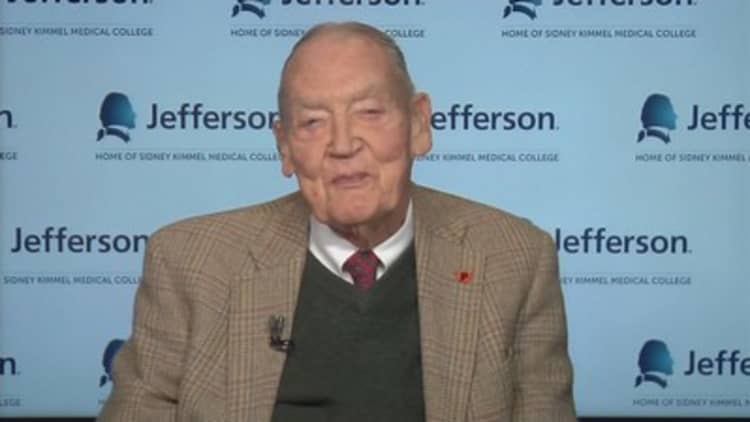Jack Bogle — legendary investor and entrepreneur — had his first heart attack at 31, when doctors discovered he had a congenital heart condition called right ventricular dysplasia. For most of his working years, he suffered arrhythmias that would sometimes cause him to collapse. Eventually, at 65, the founder of the world's largest mutual fund company, $4 trillion Vanguard, needed a heart transplant.
From his health travails, Bogle learned many life lessons about success.
"I think you could be defeated by something like (a heart condition)," he said at a recent event at Jefferson Hospital in Philadelphia. "But all these little things are interruptions in the routine of life that one should not take really seriously." Instead, he suggests that you stick to the routine you've set for yourself, no matter what. It's that routine of work that will take you where you want to go.
Bogle went back to growing Vanguard, which he said now has more than $4 trillion in assets. He stepped down as CEO when he received the transplant but has turned to writing books and speaking as an investor advocate.
He also delivered five other nuggets of wisdom for young people, with a nod to the tumultuous economy and difficult job market they face. Millennials are the only generation out of the four current generations who don't identify work ethic as a key part of their identity, according to the Pew Research Center. Many want to eschew the corporate world entirely and start their own business to take charge of their destiny.
Here's Bogle's advice to a generation facing unique challenges.
1. If you're going to be an entrepreneur, have a stomach for risk. "Being an entrepreneur is not for the faint of heart. It is a high-risk, high-reward proposition. While we would typically encourage young people to start saving for the future as early as possible, it's unlikely that a budding entrepreneur will be able to do so," he said by email. "The entrepreneur will need every bit of capital available for the business, which will likely crowd out personal savings. This may not be prudent in the traditional sense, but it is necessary. The entrepreneur's business can be thought of as a highly risky, concentrated stock position. If it doesn't work out, you can be wiped out. But if it does work, the rewards can be "beyond the dreams of avarice."

2. "Work hard as hell. It doesn't hurt." Be sure to work longer, harder and smarter. "That was the secret for Alexander Hamilton," he said. "That was the secret for me." He never mastered the idea of work/life balance, he acknowledged, remembering the first words he uttered when waking up from his heart transplant in 1996: "Can you get me a pencil and a pad?"
3. Find a company that is the right company, even if it is the wrong job for you. "Once you get in the door, it will be a much wider opportunity," he said. While his career followed a mostly straight line from the founding of Vanguard in 1975 after he was fired from Wellington Funds, careers now, don't. "The world of technology has totally altered career paths," he said, by making it easier for people to start companies and for companies to replace workers.
More from iCONIC:
What Tim Cook took from Steve Jobs to get Apple to $750 billion
4 ways Silicon Valley may thrive under Trump
Business lessons that fueled Reed Hastings' 20-year $60 billion Netflix run
4. When it comes to investing, get yourself on a routine. The popularizer of index investing, Bogle suggested young people stick to low-fee index funds. Bogle suggested setting yourself up in a fund that is 75 percent invested in stocks — "get the stock market's return" — he said. After you're making regular contributions: "Never do anything. Don't open your damn statements. Don't peek. … These are the relentless rules of humble arithmetic." Someone contributing $500 a month for 45 years, earning 5 percent a year — roughly what Bogle suggested, though he didn't suggest an amount — would have nearly $1 million at the end.
5. Don't hire a financial advisor. "Unless you need a financial advisor to help you get started in that routine, you probably don't need a financial advisor at all," he said, giving a nod of approval to, instead of a human advisor, hiring a low-cost robo-advisor to help you automate your investing. (Vanguard now offers such a service). "It's a personal choice. If you think you need a helping hand, then you do."
6. Stay in the game. Citing George Bernard Shaw's life-force philosophy, Bogle told young people that he always had a determination to "get back into life to be part of life." Indeed, one of his surgeons said that he was placed on the transplant list at the relatively old age of 65 not because of who he was but more because of his will to live. "I recall a man … whose spirit was consistent with his approach to his career and life," said Dr. Louis Samuels. "He was fully invested."
Bogle remains fully invested in life, he said, "even as I am reaching gingerly for 88, and who knows what comes after that. I hope it's 89."
— By Elizabeth MacBride, special to CNBC.com




